
- •Finite Forms of the Verb Tenses in the Active and Passive Voice
- •I. The Active Voice
- •II. The Passive Voice
- •Какой источник тепла используется здесь?
- •Modal Verbs Modal Verbs and their Equivalents
- •The Subjunctive Mood (Сослагательное наклонение
- •2. Translate the sentences into Russian paying attention to the conjunctions: in order that, so that, lest.
- •4. Define the function of the verb “would” in the following sentences.
- •8. А) Change the following sentences according to the models.
- •9. Translate the sentences into Russian and remember the meaning of the verb “to provide” in all its functions and conjunction “provided”.
- •10. Translate the sentences with the conjunctions provided, if, whether.
- •11. Translate the sentences with the conjunction unless.
- •12. Translate the sentences into English.
- •(Неличные формы глагола)
- •Формы причастия I
- •Функции причастия I
- •Функции причастия II
- •Независимый причастный оборот (The Absolute Participial Construction)
- •1. Define the function of the verb with the ending –ed Translate the sentences into Russian.
- •2. Translate the following sentences paying attention to the functions of Participles.
- •3. Find Participles in the following sentences. Translate the sentences.
- •6. Translate the following sentences into Russian.
- •10. Read the text and fill in the table with the information from the text. Using the table speak on the most important car design innovations since 1770.
- •Car of Future
- •The Gerund (Герундий)
- •Формы герундия
- •Функции герундия в предложении
- •Герундиальныйоборот (The Gerundial Construction)
- •1. Choose the sentences with the Gerund from the ones given below and translate them.
- •2. Translate the following sentences paying attention to the function of the Gerund.
- •3. Choose the Gerund in the function of an adverbial modifier.
- •4. Choose the sentences with the Gerund. Translate the sentences.
- •5. Read and translate the text without a dictionary.
- •6. Read and translate the text paying attention to the Participles and Gerund. Make up an abstract of the text.
- •7. Translate the text using the non-finite forms.
- •1. Define the function of the Infinitive. Translate the sentences.
- •2. Choose the sentences with the Infinitive in the function of an object and attribute.
- •3. Translate the sentences paying attention to the non-finite forms.
- •4. Translate the sentences paying attention to Complex Object.
- •5. Translate the sentences.
- •7. Translate the sentences paying attention to Complex Subject.
- •8. Translate the sentences.
- •9. Choose the sentences with Complex Subject. Translate the sentences.
- •10. Translate the text without a dictionary.
Unit 1
Finite Forms of the Verb Tenses in the Active and Passive Voice
I. The Active Voice
|
Tense |
Aspect | |||
|
Simple |
Continuous |
Perfect |
Perfect Continuous | |
|
Present |
V, V-s
|
be V-ing I am V-ing
|
have V3
|
have been V-ing
|
|
|
|
|
| |
|
|
|
|
| |
|
Past |
V-ed, V2
|
I, he, she it |
had V3
|
had been V-ing
|
|
Did V? |
|
Had V3? |
Had been V-ing? | |
|
did not V |
|
had not V3 |
had not been V-ing | |
|
Future |
I,we
|
|
I,we
|
|
|
|
|
|
| |
|
|
|
|
| |
Translate the sentences. Define the tense-form and the aspect of the predicate.
1. Modern industry requires materials capable of working in diverse conditions.
2. At the beginning of the 20-th century people did not think of flying at or above the speed of sound.
3. The main advantage of using gas as a fuel is that it burns with a smokeless flame and burns up with hardly any waste.
4. This process will result in the rearrangement of components.
5. The mass of an atom does not determine its chemical properties the latter depends primarily upon the charge of its nucleus.
6. The theory gave a satisfactory explanation of experimental facts.
7. The power station will operate on a dual pressure steam cycle with the turbine high pressure cylinder designed to accept steam at two pressures.
8. The term operation implies to some extent a repetition of some action or some parts of an action.
9. The circumstances were favourable and we completed our work in time.
10. Electronic computers calculate the trajectories of spaceships, help to prepare, launch and monitor the rockets that carry the most complicated and sophisticated equipment.
11. The method of cooling suggested by this engineer will improve the engine’s efficiency.
12. A body at high temperature gives up heat to the surrounding air and heats it.
13. These experiments left little doubt that such phenomena exist.
14. The question is whether this scientific model will apply to the industrial plant.
15. The regulation of the speed of machines was the earliest application of closed-loop control systems.
16. Electronics gives the space pilots easy control for soft landing on other planets.
17. Faraday’s natural scientific conception created a revolution in the understanding of electrical phenomena.
18. Collision-warning radars will operate automatic control if there is a danger of meteor hitting the spaceship.
Science is becoming a leading factor in the progress of mankind.
Water was pouring from the hole at a rate of three hectoliters per minute.
The importance of space means of communication is increasing every year.
Almost every processing industry is now exploring the use of microwave heat.
We will be living in a different world in the future: machines will be doing many jobs, that are done by people today, we will by travelling to other planets regularly and someone from other planets will be visiting the Earth.
We were watching a new double planet formation.
Scientists of different countries are successfully developing quantum generators called lasers, and are looking for practical uses for a new kind of ray which is millions of times brighter than the sun.
What will you be doing in the laboratory tomorrow morning? We shall be watching the operation of a new device.
He made several mistakes when he was typing the paper.
The smaller the phenomena man is investigating, the bigger, costier, and more complex is the equipment needed to conduct such research.
Scientists and engineers were concentrating their attention on developing a power generating installation.
In an open system information is continually flowing within the system and between the system and its environment.
What will she be doing next term? She will be lecturing at the university.
He was looking through the morning mail when his boss called him.
They were listening to the story told by a survivor of the terrible earthquake.
The force of gravity is pulling us downwards towards the centre of the earth.
He will be interviewing a foreign delegation at this time tomorrow.
Radioactive materials are constantly undergoing a change.
C
These scientists have succeeded in designing a small-dimensioned electronic device.
Achievements in the studying of atom structure have opened up new, practically unlimited possibilities to humanity for further mastering of nature’s forces.
This conference had provided an opportunity for an exchange of views on the techniques, problems and future development of automatic programming.
Mankind has never experienced changes in life and work on such a scale.
Have you already finished your diploma work? No, I shall have finished it by the end of June.
This design bureau has developed and brought to mass production a series of highly reliable liquid propellant engines for launch vehicles of various class and destination.
Electronics has widened our vision and given us the change to see the microworld more clearly.
The factory will have fulfilled the plan by the end of December.
They will have prepared all the documents by the time the director returns.
I had already read two chapters of the book when you came yesterday.
Rapidly advancing technology of satellites has made critical the need for smaller electronic components.
From the earliest times human beings have wondered about the shape of the earth.
We have expressed satisfaction with the design that was so original.
By the beginning of the lecture the laboratory assistant had brought all the necessary diagrams.
Practically every advancement in the aerospace industry has depended on new and better materials.
By the end of the year scientists and designers will have developed a new generation of robots.
The design and the use of servomechanisms have grown to be an extremely important part of electric and mechanical technology.
Modern science has had more successes than failures in its most highly developed departments, notably in physics, astronomy, and genetics.
D
Our researches have been investigating the problems of environmental protection for three years now.
I had been working on my report for some hours when he came.
By the 1st of January he will have been working at the laboratory for six years.
He has been following this scientist’s research with great interest for many years.
When you enter the university you will have already been studying English for more than seven years.
They have been developing a very fine technology for obtaining transistors with pre-set physical properties since last year.
They have been discussing the results of the experiment since early morning.
More recently this method of analysis has been growing in favour and it will probably find use in certain manufacturing processes.
Measuring instruments have been reporting the temperature, pressure, rate of flow since the beginning of operation of a test installation.
By the end of the month they will have been accumulating and analyzing data connected with their research for several months.
They have been doing a lot to improve the quality of the devices lately.
They have been trying to solve the problem since they began to work together, but with no success.
The designer had been making some changes in the original project before they started to realize it.
The research group had been studying the properties of this substance for a long time.
We will have been assembling the installation for three months by the first of December.
He had been trying to establish business contacts with the company for a long time.
She has not been talking to her adviser long.
I have been having a lot of trouble with this equipment since I bought it.
Comment on the use of tenses in the following sentences and translate them into Russian.
Every force does its own job no matter how many other forces are acting.
Physicists didn’t notice a discharge was taking place.
When we speak of management and its decisions we are really speaking of the setting of opinion or belief. This is not a process to be oversimplified.
Radar provides new information on meteorology and astronomy measuring winds at high levels, detecting meteors and studying cosmic rays.
The upsurge of electronics after the World War II gave rise to an entirely new class of computing machines expected to be employed both in industry and business.
The change in velocity resulted from the force which was acting from outside.
The scientist has studied the new kind of radiation and now we know how to detect it.
The application of the technique will be far more practical in future than is the case today.
The questions arises as to whether such primitive form really has functional significance.
Another ten years and you will have forgotten all about it.
During the past century large telescopes equipped with photographic plates have provided most of what we know about normal stars, stars whose temperatures range from 2,000 degrees kelvin, or a third the temperature of the sun.
Certain celestial objects radiate thousands of times more energy at infrared wavelength that the sun does at all wave length.
Just as the television has extended human sight across the barriers of time and distance, so the computers extend the power of the human mind across the existing barriers.
At first most of his colleagues didn’t like his new ideas but after some extremely successful experiments he made, they saw he was right.
I’ve just read an article which is very important for the work I/m doing now.
The speed at which today’s modern computers operate and rapid advances in data storage capacity have, over the past few years, caused something of a revolution.
Each excited electronic state of the atom has a characteristic lifetime that indicates the average time it takes an electron to fall to a lower level and thus radiate a proton.
We are having some trouble with the machine we have just installed.
The problem has been, and is, the development of the appropriate materials and the development of the best engineering techniques for their utilization.
The effects produced by the small planets like the Earth and Mars are trivial, but Jupiter and Saturn modify and even radically change the orbits of comets and asteroids.
Communication systems have become more sophisticated and their data-transmission rate has increased.
Many scholars have suggested that we are indeed entering a new age whether they label it “post-industrial” or “scientific” or whatever.
Define the kind of the subordinate clause. Select and analyse the predicate in each sentence. Translate the sentences.
When they advanced their hypothesis they had no adequate tool to make it practicable.
His interpretation seems to be related to the analysis we have just examined.
What the businessman needs to know is how the new developments can be applied in industry.
The approach indicated above is different from what we may call the traditional approach.
As the X-ray method of examining inner organs is to a certain extent harmful, scientists have developed a new method of ultrasonic examination.
A missile which flies at 35,000 feet encounters less air resistance than a missile flying near the sea level.
One of the most interesting developments in this field is the great number of small firms that have begun manufacturing computers during the last few years.
Subsequent work has made it clear that the two factors interact giving rise to a sudden change of the whole pattern.
A nuclear reactor will be practical at some future time when very large long-life space vehicles come into use.
We define an atom as the smallest particle of an element which takes part in a chemical change.
Roentgen became aware of the existence of X-rays when he noticed that a fluorescent substance became luminous even through a thick layer of some material.
Hydraulic turbines are the machines that convert the energy of flowing water into mechanical energy.
Today we are finishing the job we started a year ago.
We are going to write an article about the experiments we have made recently.
When we came to the factory, the workers were still installing the new equipment.
When I switched on the radio, they were broadcasting a very interesting program
Great difficulties arose when we were applying this method to practice.
He found an error when he was making an additional check.
We obtained the desired information when we were analyzing the data.
We didn’t know that you had already compared and discussed the results.
The project will never succeed if there is no understanding among the participants.
You will benefit a lot if you sign the contract.
They won’t change their decision until they get more reliable information.
A question that has received considerable attention concerns the possibility of this mechanism.
That these reactions occur at such temperatures is not very surprising.
Use the verbs given in brackets in proper tenses.
Present Indefinite or Present Continuous
What language they (to speak) in Holland? What language he (to speak) now?
The professor (to speak) five foreign languages. Right now he (to speak) Dutch.
My friend always (to tell) me the truth, but I see that she (to tell) a lie now.
She (not to understand) what the teacher (to explain).
I (not to recognize) the man who (to give) a talk.
What you (to think) about? – I (not to think) of anything, I just (to have) a rest.
She often (to come) to see you? – Not so often, she (to be) a student now and (to be) very busy.
What you (to look) at? – I (to look) at that picture over there. It (to be) beautiful.
Ring me up when you (to be) free. I (to have) something to discuss with you.
You (to understand) what they (to speak) about? – No, they (to speak) too low.
Future Indefinite or Present Indefinite
The article (not to be) very difficult. He (to translate) it tonight.
My friend (to leave) tomorrow. She (to say) she (to write) to me every week.
I think he (to make) good progress very soon because he (to work) hard.
We (to have) another discussion as soon as we (to receive) the final results.
If you (to translate) this article into Russian, I (to use) it in my report.
If the sun (to be) red, it is a sign that we (to have) a fine day tomorrow.
There (to be) some mistakes in this document. – All right. I (to type) it again.
We (to contact) you if we, (to have) the information you are interested in.
Leave a note for them on the table and they (to see) it when they (to come)
You (to do) anything special tomorrow? – Yes, if my cousins (to come), I (to show) them round London.
Past Indefinite or Past Continuous
He (to come) in and (to see) Nelly who (to draw) a strange picture.
I (not to hear) what he (to say). I (to type) at the moment.
We (to talk) in silence for 5 minutes, then he (to speak).
When it (to happen)? It (to happen) when you (to talk) to your secretary.
Nobody (to know) what he (to think) about at that moment.
She (to make) good progress in French as an experienced teacher (to teach) her.
Paul (to walk) aimlessly up and down the room for a long time. He (not to know) what to do.
I (to sit) on the bench for half an hour and then (to begin) reading a book).
You (to see) him in the morning? – Yes, he (to stand) in the hall speaking to his colleagues.
While the manager (to talk) on the phone, the secretary (to get) the documents ready.
Past Indefinite or Present Perfect
He (to forget) his French since he (to leave) Paris.
The director (not to sign) the document yet.
I (to lose) my keys and (not to remember) where I (to see) them last.
You (to hear) from Jane lately? – Yes, I (to get) a message from her last night.
I (to get) a fax from Boston an hour ago, but I (not to answer) it yet.
You (to speak) to Ann yesterday? – No, I (not to see) her lately. I (not to remember) when I last (to see) her.
Where (to be) Nikolayev? Why he (not to come) to the Institute? – I (not to see) him today. I am afraid he (to fall) ill.
The lecture already (to begin). When it (to begin)? It (to begin) a few minutes ago.
I (not to see) them since we (to graduate) from the Institute.
You (to discuss) this problem with him, when you (to be) in Moscow?
Present Perfect or Present Perfect Continuous
They (to make) the experiment since eight o’clock in the morning. They only just (to finish).
Ann (to fail) her exam three times because she (to be) so bad in mathematics. But she (to practise) for a week now, I hope she’ll pass it in the end.
Customers (to ring) up all morning complaining about getting incorrect bills. – I know. Something (to go) wrong with our computer.
Scientists (to study) this substance for many years. They already (to discover) some useful properties of this substance.
I (to try) to learn Japanese for years, but I (not to make) good progress yet.
He (to work) at his report since Monday. He (to begin) just to write conclusion.
They (to discuss) this problem for rather a long time, but (not to come) to an agreement yet.
How long she (to study) music? – She (to study) music since her early childhood.
I (to look) through, the papers for more than two hours already, but I (not to find) anything interesting yet.
How long you (to know) each other? – Since we went to college.
Present Perfect or Past Perfect
He looked at the girl and understood he (to see) her somewhere before.
You ever (to see) a flying saucer?
Nick hoped there (to be) no post since Friday.
He said they (to discuss) everything.
We couldn’t answer your fax at once. We (not to take) a final decision by that time yet.
We (not to see) him for ages. They say, he (to change) greatly.
The news that he (to leave) the town was a surprise to all of us.
By the time she came we (to do) the greater part of the work.
The secretary (to type) all the documents by the time the chief returned.
Mrs Brown lives next door but she never (to say) more than “good morning” to me.
Past Indefinite or Past Perfect
The teacher was a stranger to me. I never (to see) her before.
The house was very quiet when I (to get) home.
We felt happier when they (to leave).
She gave him the book his teacher (to recommend).
They (to finish) the translation by 5 o’clock.
She got a message saying he (to pass) the exam.
Margaret was late for work. Her friends (to be) very surprised. She never (to be) late before.
By the time we (to arrive), the discussion (to finish).
Before we (to take) Paul to the theatre, he never (to see) a play on the stage before.
He (to came) from a small town, and nobody (to hear) of him before.
Put the infinitives in brackets in the proper tense form. Translate the sentences.
We just (to finish) the analysis of the results.
When he entered the laboratory he (to see) that the researchers (to discuss) the results of the experiment which they just (to complete).
Now we (to study) the possibilities of using solar energy for practical purposes.
He (to look for) his notes but could not (to find) them anywhere.
We (to discuss) this problem for two years but still cannot (to find) the solution.
Their experiment (to result in) an unexpected discovery.
The rocket (to provide) the only practical means needed to place an artificial satellite in an orbit about the Earth.
After World War II complex vehicles and weapons (to be) merely assemblies of separately designed components rather than integrated systems.
K.E.Tsiolkovsky (to feel) sure that space flight (to be) a scientific possibility.
She (to read) the book ever since she (to come) from the Institute and couldn’t (to tear) herself away from it.
The lecture followed by a demonstration of the experiment (to take place) yesterday.
He (to predict) the phenomenon long before its discovery.
I am afraid they can’t (to settle) the problem you (to talk) about so soon.
They (to manage) to obtain the compound by the end of the month.
Answer the questions paying attention to the difference in the use of Present Perfect Continuous and present Perfect.
Example: What have you been doing since two o’clock? (to write letters). I have been writing letters. But I have not written them yet.
What have you been doing since you came back from the Institute? (to check some data)
What have you been doing since morning? (to make measurements)
What have you been doing since I rang you up? (to repair the recorder)
What have you been doing since I left? (to solve some equations)
How long have you been gathering these data? (since I started performing the experiment)
Since when have you been making these observations? (last month)
How long have you been studying this theory? (since I started working at the laboratory)
Make up all possible types of questions to the following sentences.
All solid bodies become breakable at temperatures close to absolute zero.
Scientists all over the world are looking for more efficient ways of generating electricity directly from the atomic fuel.
A self-controlling device operates properly in all modes of work.
They have introduced an automatic control system lately.
This information will enable the scientist to make a forecast for the next few years.
They have been applying a high power telescope since they began their research.
Different automatic pilot systems will be providing a wide variety of control during the flight.
Translate the sentences into English.
Каждый предмет, независимо от того, какова его температура, излучает энергию.
Сооружение первой экспериментальной радиолокационной станции началось в 1935 году.
Пластичность многих веществ возрастает при нагревании.
Только недавно мы оценили потенциальные возможности этой области.
Определенные сложности возникают при любой попытке создать лабораторные модели астрофизических систем.
Каждый сегодня знаком с принципами, на которых работает радар.
Жидкости принимают форму сосуда, содержащего их.
Интенсивное изучение этого явления привело к некоторым важным открытиям.
Выставка, открытая в нашем городе, привлекла всеобщее внимание.
Некоторые ученые и инженеры работают над усовершенствованием традиционных производственных процессов, другие разрабатывают новые технологии.
Недавно наши исследователи осуществили очень важный эксперимент, и его результаты были в полном соответствии с их более ранними исследованиями.
Не спеши! Лекция начнется только через полчаса.
Кого ты ждешь? – Я жду нашего преподавателя. Он сейчас разговаривает с деканом.
Она просматривала почту, когда зазвонил телефон.
Книга, которую он только что написал, будет определенно пользоваться успехом.
Все устройства, которые мы только что посмотрели на выставке, очень современны.
Фирма, о которой я вам только что рассказал, предлагает различные виды оборудования для легкой промышленности.
Я уверен, что обсуждение не займет много времени.
Что вы будете делать на следующей неделе, Я буду принимать участие в конференции.
Вы думаете, вам потребуется много времени, чтобы закончить работу, - Я думаю, около полутора часов.
Он преподаватель физики. Он преподает с тех пор, как окончил университет.
Они получили интересные данные в ходе своего исследования.

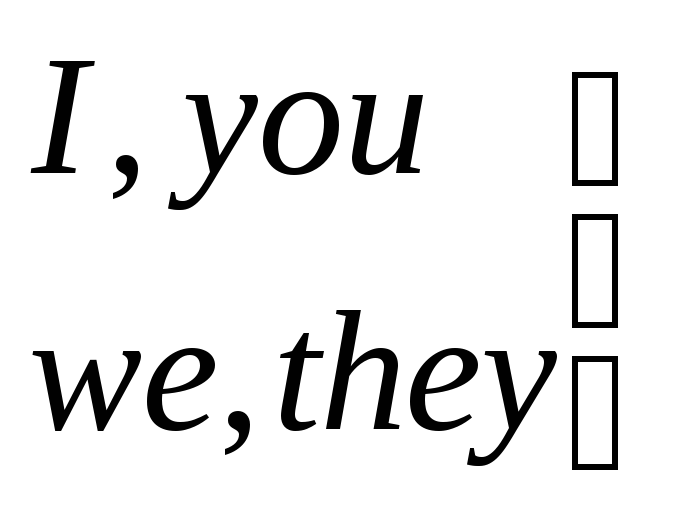 V
V V-s
V-s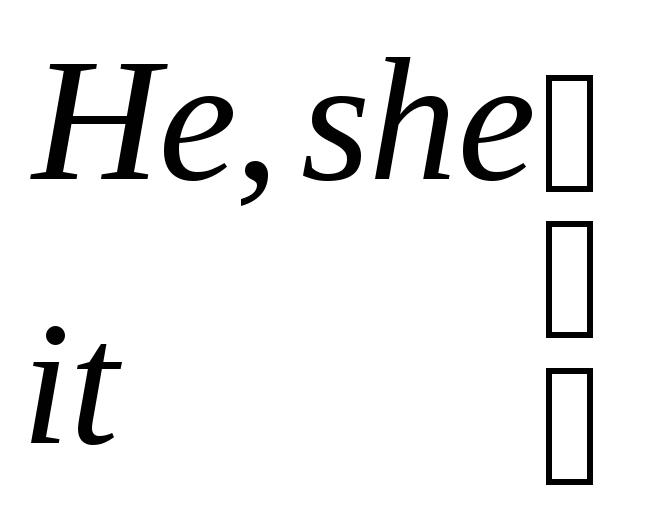 is
V-ing
is
V-ing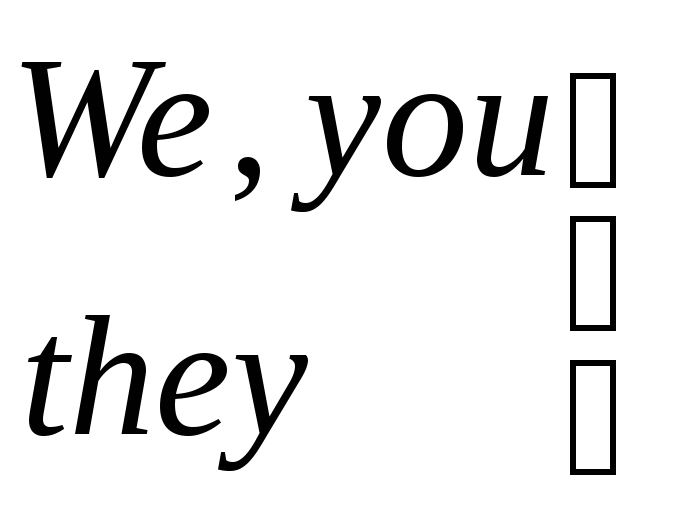 are
V-ing
are
V-ing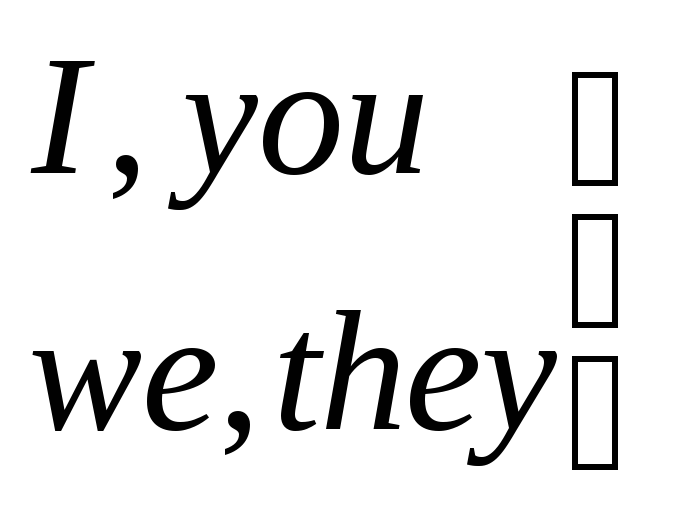 have
V3
have
V3 has
V3
has
V3 have
been V-ing
have
been V-ing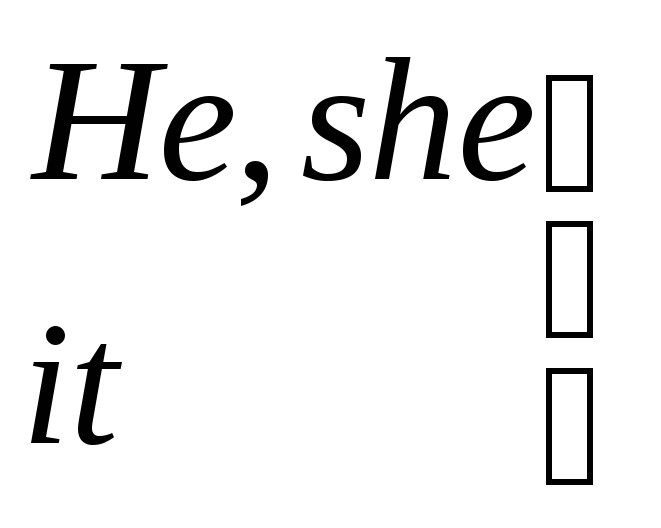 has
been V-ing
has
been V-ing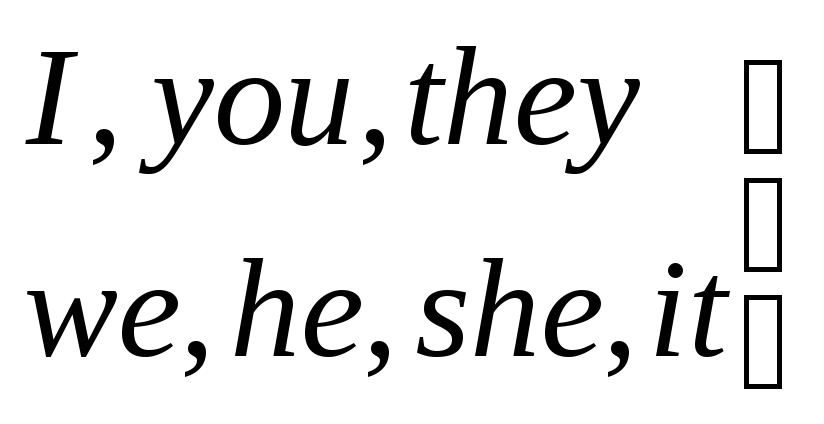 V2V-ed
V2V-ed V-ing
V-ing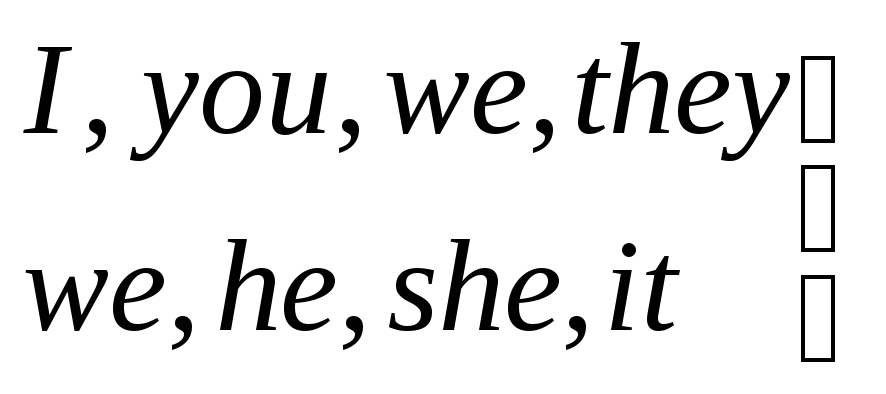 had
V3
had
V3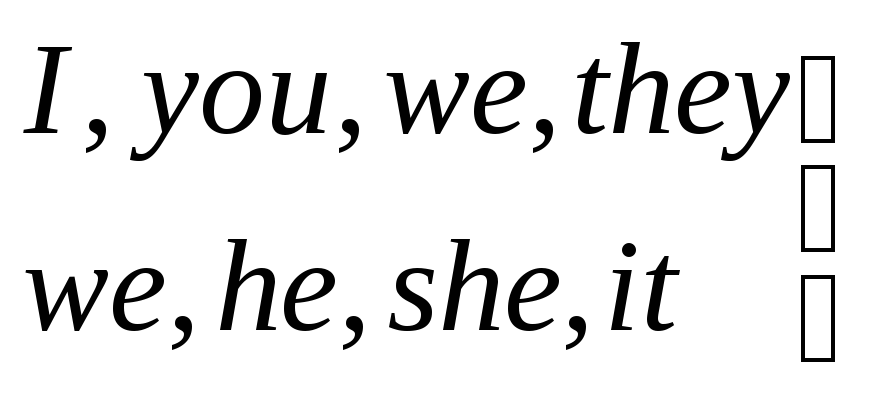 had
been V-ing
had
been V-ing